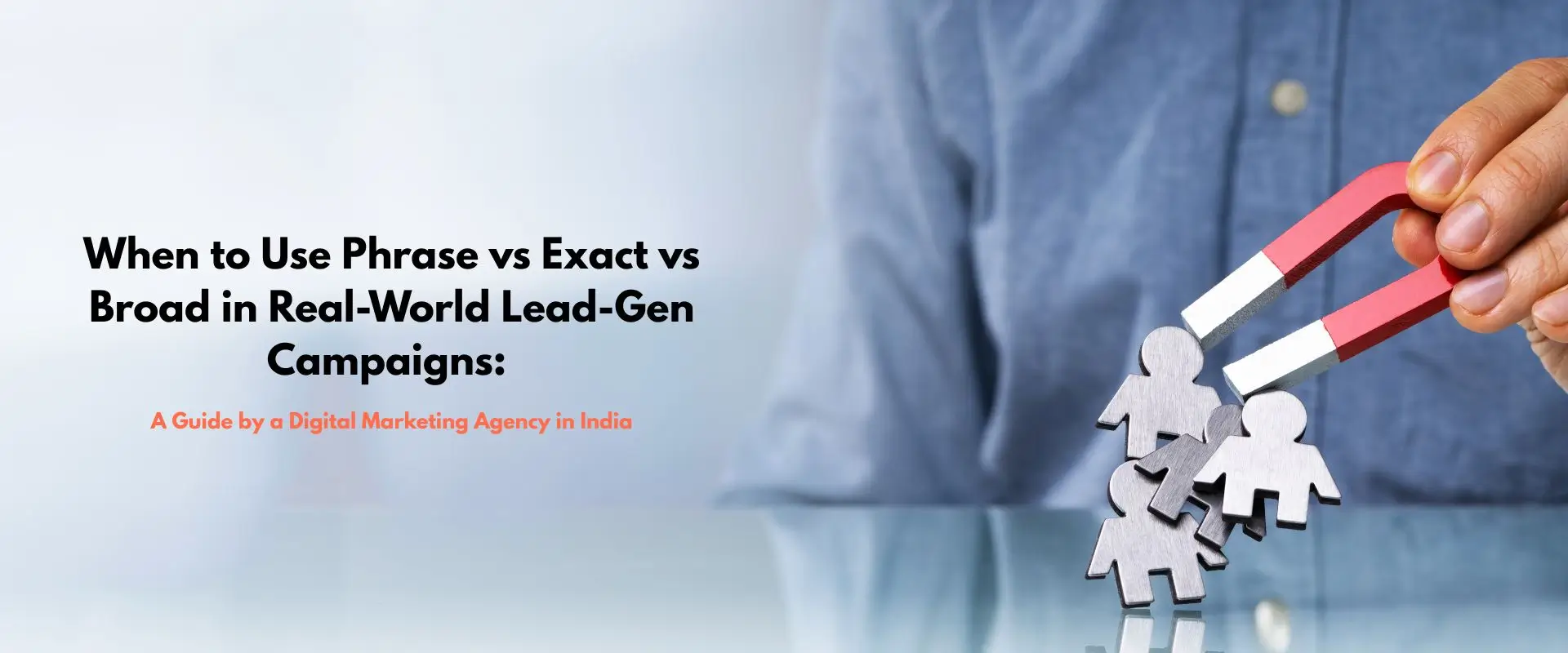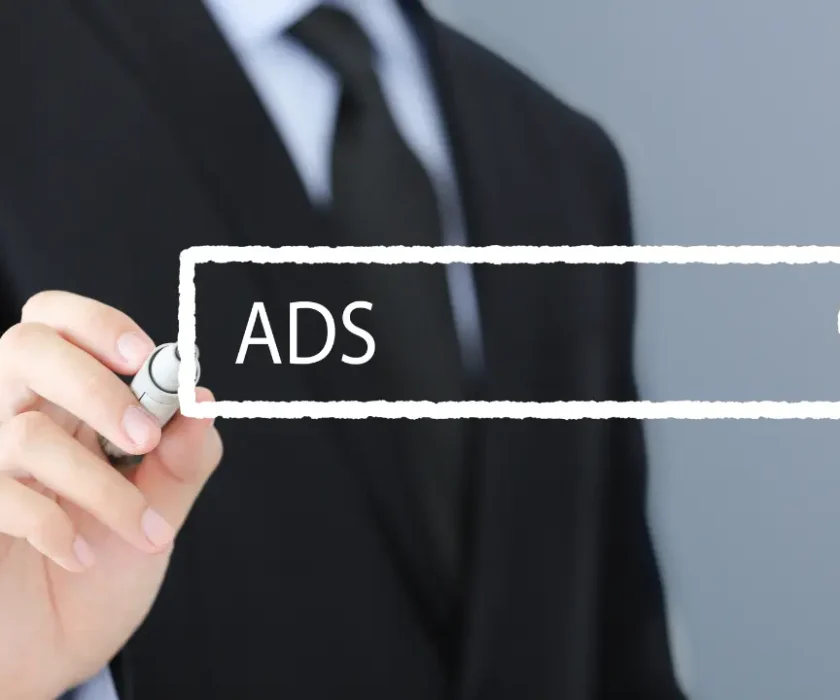Table of Contents
ToggleWhen to Use Phrase vs Exact vs Broad Match in Google Ads Lead Generation Campaigns
Introduction: Why Match Types Still Matter in 2026
Running Google Ads today is no longer just about selecting keywords and setting budgets. With Google’s expanded semantic intent matching, ads can now trigger for queries that don’t exactly match the keyword list. While this creates opportunities for discovery, it also increases the risk of irrelevant traffic and inefficient spend when match types are not used correctly.
Across lead generation campaigns in industries such as real estate, education, healthcare, and IT, one question consistently comes up: Should Phrase Match, Exact Match, or Broad Match be used for better results?
The answer depends on several factors, including campaign goals, budget flexibility, conversion data maturity, and how much control is required over search intent. This guide breaks down when to use Phrase vs Exact vs Broad match in Google Ads lead generation campaigns, using real-world performance insights to help you make informed decisions and manage Google’s smart matching behavior more effectively.
For businesses evaluating a digital marketing agency in Hyderabad, understanding how keyword match types affect lead quality and cost helps set realistic expectations for Google Ads performance.
Understanding Match Types in Google Ads
Before diving into strategies, let’s revisit what each match type means in practice:
- Exact Match [keyword]
Your ad shows only when the search query matches your keyword closely.
Example: [digital marketing agency india] could trigger for “digital marketing agency india” or “india digital marketing agency.” - Phrase Match “keyword”
Your ad shows when the search query includes your keyword phrase, even with extra words before or after.
Example: “digital marketing agency in india” might trigger for “best digital marketing agency in india for startups.” - Broad Match keyword
Your ad shows for queries related to the keyword, even if they don’t include the exact phrase.
Example: digital marketing agency could match to “SEO services company,” “social media agency,” or even “online advertising consultant.”
Google has also added semantic intent matching, meaning Exact and Phrase are no longer 100% “exact.” Google interprets intent behind queries, which makes match type management even more critical.
Real-World Campaign Example: Lead Gen for a B2B Service
Let’s imagine a client—a B2B SaaS startup in Hyderabad—wanted to generate qualified leads through Google Ads.
- Goal: Capture high-quality demo requests.
- Challenge: Their ads were showing for irrelevant queries like “free marketing tools” even when they used Phrase Match.
- Solution: By strategically combining Exact, Phrase, and Broad (with tight negatives), we reduced wasted spend by 35% while doubling qualified leads.
When to Use Exact Match
Use Exact Match when:
- You know your high-intent, money-making keywords.
- You want control over budget allocation.
- Your industry has high CPCs (real estate, legal, SaaS, etc.).
Example: For a campaign targeting Digital Marketing Agency India, we use:
- [digital marketing agency india]
- [digital marketing agency in india]
This ensures ads only appear for users specifically looking for your service, reducing wasted clicks.
Looking for experts who can set up high-converting campaigns? Explore our Google Ads Management Services.
When to Use Phrase Match
Use Phrase Match when:
- You want to capture long-tail variations.
- You want some flexibility but still need control.
- You’re testing new keywords or markets.
Example: For SEO lead gen, “seo services in india” may match:
- “affordable seo services in india”
- “best seo services in india for startups”
Phrase Match balances reach + relevance, making it ideal for campaigns where volume matters, but you still want to filter intent.
Our SEO Services in Hyderabad are a perfect example of how long-tail targeting can drive local leads.
When to Use Broad Match
Use Broad Match when:
- You want to discover new queries Google thinks are relevant.
- You pair it with Smart Bidding strategies like Max Conversions or Target CPA.
- You’re in early testing mode.
Risk: Without negative keywords, Broad Match can quickly waste budget.
Example: For digital marketing agency, Broad Match may trigger:
- “online advertising company”
- “best seo consultants”
- “website promotion services”
When controlled with negatives and smart bidding, Broad Match can expand reach and uncover new profitable terms.
As a full-service Digital Marketing Agency in India, we combine broad match discovery with phrase/exact targeting for optimal performance.
How Google’s Semantic/Intent Matching Changes Things
Google now interprets intent rather than exact words. That means:
- [digital marketing agency india] may still trigger for “top digital marketing companies india”.
- “seo services in india” may match with “best seo firms india.”
As a leading Digital Marketing Agency India, we’ve observed that this shift requires smarter negative keyword management. Instead of just blocking irrelevant queries, you need to structure campaigns around themes and intent, not just keyword lists.
How to Control Match Types Effectively
To control Google’s semantic matching while still benefiting from it:
1. Use Tiered Campaign Structure
Campaign 1: Exact Match (high intent, controlled budget).
Campaign 2: Phrase Match (mid intent, discovery).
Campaign 3: Broad Match (low intent, research + AI bidding).
2. Leverage Negatives
Add irrelevant terms as negatives regularly (e.g., “free,” “jobs,” “cheap”) to avoid waste.
3. Monitor Search Terms Weekly
Constantly refine your keyword strategy by checking which queries are actually triggering your ads.
4. Test & Rotate
No single match type is “best.” Test combinations to see which delivers the best CPL (Cost Per Lead).
Best Practices from DIGITALOPS Campaigns
- Real Estate Client (Hyderabad): Used Exact for “luxury apartments Hyderabad” → CPL reduced by 42%.
- EdTech Client (Bangalore): Phrase Match for “online courses in India” → 3X lead volume.
- IT Services Client (Global): Broad + Smart Bidding uncovered “cloud security consultant India” → new profitable service line.
These results prove that match type strategy + intent understanding = campaign success.
In a Nutshell: Choosing the Right Match Type with a Digital Marketing Agency in India
At the end of the day, the right match type depends on your goals:
- Exact Match → precision + high intent.
- Phrase Match → flexibility + long-tail capture.
- Broad Match → reach + discovery (with negatives + smart bidding).
With Google’s semantic intent matching, it’s no longer about “which is best,” but how you combine them effectively.
At DIGITALOPS, we pride ourselves on being a Digital Marketing Agency in India that doesn’t just run ads—we build strategies tailored to your business, balancing cost efficiency and lead quality.
Ready to optimize your campaigns with the right match type strategy? Contact DIGITALOPS today and let’s build a lead-gen system that works.




